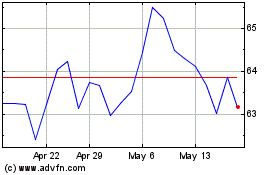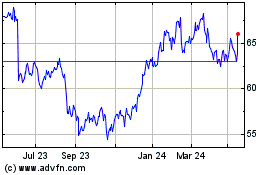Japanese Stocks on Track for a Winning Week
May 13 2016 - 1:10AM
Dow Jones News
Mining and materials stocks sent Japan's benchmark index lower
on Friday, capping a volatile week for shares across the
region.
Still, the Nikkei Stock Average is headed to gain 2.2% for the
week, making it one of the better performing Asian stock
benchmarks. The Shanghai Composite Index and Hang Seng Index are on
track to lose 2.8% and 1.9%, respectively.
But concerns about volatile oil prices—and more recently gloomy
updates from some of the largest U.S. retailers—were on display on
Friday, weighing on most major stock benchmarks.
"Two or three weeks ago, there was a semi-optimistic
wait-and-see mode amongst investors," said Andy Maynard, head of
Asian equities at HSBC. Now, "we are seeing outflows."
The Nikkei, initially buoyed by a strengthening dollar against
the Japanese yen overnight, was recently down 1.1%. A weaker yen
helps the competitiveness of Japanese exporters, thereby supporting
their shares. But the local currency reversed its overnight move
and was last up 0.2% against the dollar.
Leading the declines in Japan on Friday was oil explorer Inpex
Corp., which fell 2.4% to 827 yen, as crude oil prices fluctuated
in recent sessions. Brent crude was last off 0.7% at $47.74, also
reversing overnight gains
Meanwhile, commodities firm Mitsubishi Materials Corp. tumbled
11% to ¥ 313 after the company provided lower sales and profit
forecasts for the fiscal year that started in April, citing a
cloudy outlook for metal prices.
Elsewhere in the region, the Hang Seng Index was recently off
0.9%, Australia's S&P ASX 200 was down 0.7% and the Shanghai
Composite Index was flat.
Pressures on regional stock this week have been mostly global:
Both fluctuations in oil prices and the coming June vote on
'Brexit' are causing uncertainty for traders. Meanwhile, U.S.
corporate announcements have been disappointing and the U.S.
Federal Reserve has toned down its outlook for the American
economy.
Nonetheless, Japanese shares have fared better this week as the
yen has weakened by about 1.6% in the same period.
Foreign investors have been snapping up Japanese shares
recently, buying a net 1.1 trillion yen ($10.1 billion) worth of
equities in April, after three months of net selling, according to
latest data from Japan's Ministry of Finance. Traders also say the
Japanese government has been buying stocks to support the
market.
"Japan's bucked the selling, amid [the] at-home economic
initiative," Mr. Maynard said.
Still, he added that for most of the region, especially China
and Hong Kong, "people are looking to shift positions [in stocks]
to raise cash, either to sit on cash or to buy bonds."
Kosaku Narioka contributed to this article.
Write to Chao Deng at Chao.Deng@wsj.com
(END) Dow Jones Newswires
May 13, 2016 00:55 ET (04:55 GMT)
Copyright (c) 2016 Dow Jones & Company, Inc.
ASX (ASX:ASX)
Historical Stock Chart
From May 2024 to Jun 2024

ASX (ASX:ASX)
Historical Stock Chart
From Jun 2023 to Jun 2024
